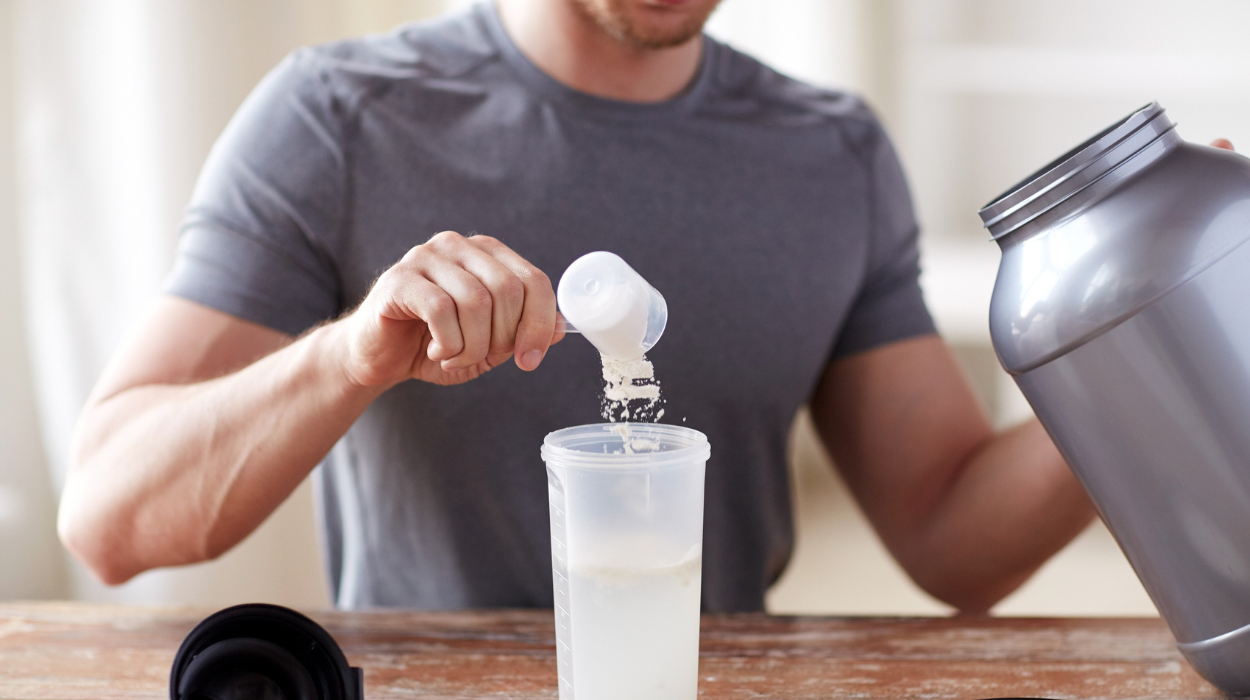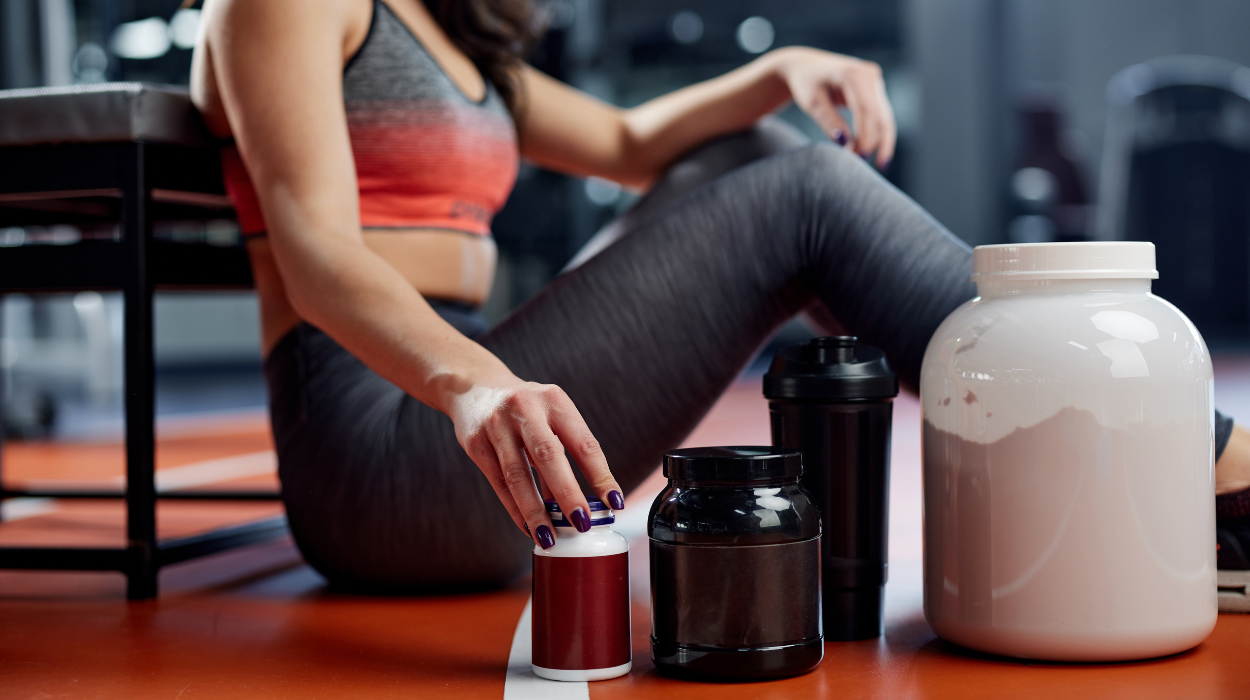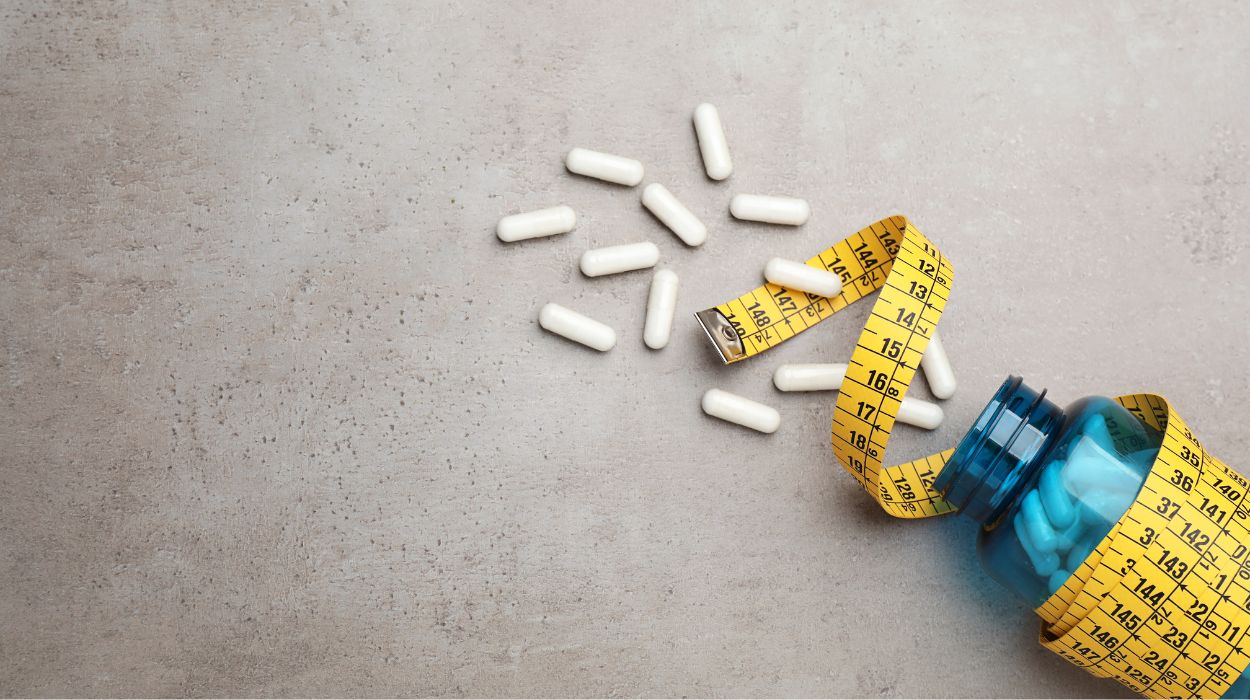Cutting supplements are often used with diet and exercise to help shred fat and build lean muscle mass. Many options are on the market, so it can be easy to wonder, “Which are the best supplements to get shredded?” Maintaining safety while using these supplements is crucial, and while individual needs may vary, safety should never be traded for effectiveness.
We will discuss some of the more popular supplement options in more detail by considering how they work, what the available research shows about effectiveness, and whether there are any important safety precautions to be aware of. Let’s get started!
5 Supplements To Get You Shredded
The best supplements for building muscle and shredding fat offer the combination of safety and effectiveness when paired with a balanced diet and regular exercise. These supplements include:
- Whey protein supplements.
- Branched-chain amino acids, or BCAAs.
- Creatine.
- Thermogenics.
- Nitric oxide boosters.
Learning more about these supplements can help you get the most out of them while ensuring safe use. Combining these supplements with a balanced hypocaloric diet and daily exercise will help you reach your weight-loss goals while avoiding potential nutritional deficits brought on by dietary restrictions. Staying hydrated is also part of the game plan.
Best Supplements That Get You Shredded

The two primary goals of fat loss and muscle gain can each be accomplished individually with diet, exercise, and specifically targeted supplements. Trying to achieve both of these simultaneously requires a more careful approach. For instance, building muscle and maintaining general health may become more difficult if a caloric deficit results in a poorly balanced diet.
Balance is key, and understanding how these supplements work can help you maintain this balance. Consulting your doctor and a registered dietitian can also help you monitor your progress and ensure your overall health is well-maintained.
So, which supplements help you burn fat or lose weight, and which help with muscle growth?
Whey Protein Supplements
Creating an overall caloric deficit is often used by individuals looking to increase body fat metabolism and lose weight. Certain nutrients, essential for building and maintaining muscle tissue, may also be limited when calories are limited. Whey protein concentrate is a nutritional supplement that provides all the essential amino acids the body requires from the diet.
Individual protein supplement products can vary, but the general approach is to provide a more complete source of protein that limits fats, carbohydrates, and overall caloric intake. So, the approach is to eat fewer calories overall and support weight loss while maintaining the amino acids needed for muscle protein synthesis.
Whey protein stimulates muscle synthesis[1] to a greater degree than other protein sources such as casein or soy. Furthermore, the components in whey protein[2] have been found to be beneficial in weight loss and blood sugar control. Better blood sugar control leads to improved appetite control.
This requires consuming enough daily complete protein, which for the average individual is 1.2 grams per kilogram of body weight.[3] For the elite athlete who does not want to lose muscle during weight loss, one would want to consume closer to 2.0 grams of protein[4] per kilogram of body weight.
Whey protein supplements are backed by good evidence of safety and beneficial effects for muscle mass and strength. A review of multiple studies[5] evaluating whey protein combined with a healthy diet and resistance training reported significant muscle strength and mass gains. It is important to note that results appear to be heavily dependent on resistance training exercises.
Individuals with reduced kidney function should be cautious before starting any protein supplementation. High-protein diets have been associated with elevated rates of kidney complications.[6]
Branched-Chain Amino Acids
Some individuals take a more targeted approach by using branched-chain amino acids, or BCAAs. These are essential amino acids, meaning the body does not produce them, and they must be supplied by diet or supplementation. Examples of BCAAs are:
- Valine.
- Leucine.
- Isoleucine.
BCAAs have been used in supplements for decades to build lean muscle. Some studies have shown some benefits from supplementation, and these may logically be extended to healthy adults intending to build muscle mass. For instance, leucine[7] has been associated with increased muscle growth in elderly patients at risk for age-related muscle loss.
Amino acids are the building blocks of muscle proteins. There are 20 total amino acids[8] involved in muscle protein synthesis, nine of which are considered essential amino acids. BCAAs account for some of the necessary building blocks, but it is crucial to maintain a proper diet that also delivers each of the remaining essential amino acids.
If you have reduced liver function or diabetes,[9] it is important to consult your doctor before using BCAA supplements. There are concerns that these supplements may contribute to these conditions or make them worse. In contrast, BCAAs have been found to be beneficial in treating chronic renal failure.
Creatine
Supplementation with creatine has also been widely used and researched. Creatine is another amino acid, so supplementation focuses primarily on increasing muscle protein synthesis or maintaining existing muscle mass.
Creatine effectively increases[10] muscle mass when combined with adequate exercise training in young, healthy individuals. More research is needed to determine its effects in an older population group. Similar to other approaches like L-carnitine that provide a single amino acid, ensuring your diet remains well-balanced and will provide each essential amino acid is important.
Studies related to the specific effects of creatine on fat mass have been mixed.[11] It should be noted that combining creatine supplementation with a caloric deficit and adequate exercise would likely support fat loss overall. Creatine is unlikely to counteract any fat loss from diet and exercise.
Individuals with existing concerns about kidney function[12] should use creatine supplements cautiously.
Thermogenics
Energy-enhancing products or fat burners, referred to as thermogenics, are meant to enhance fat metabolism. Caffeine and green tea extract are often included in supplements for this purpose.
- Caffeine: Often incorporated in pre-workout supplements, caffeine is meant to provide an energy boost. There is also evidence[13] that caffeine may improve fat oxidation rates during exercise, but there is some variability among individuals. A minimum dosage of 3.0 mg/kg may be needed for a significant effect — which may be 200 mg or more for many — so it is important to be mindful of other sources of caffeine.
Being aware of the caffeine content in your supplements is helpful. If you have other sources of caffeine in your daily routine, these doses may add up quickly. Higher doses are more likely to make you feel jittery or cause you to have difficulty sleeping, so taking them earlier in the day is advisable.
- Green tea extract: Green tea and its primary catechin epigallocatechin gallate, or EGCG, are common components of workout supplements. Research studies have backed up its use as an exercise supplement that provides additional support for burning fat. For example, in a study[14] evaluating green tea extract combined with exercise, body fat percentage, body mass index, and waist circumference were significantly reduced when compared to individuals performing exercise alone.
As always, it is important to consider the dosage of supplements. For example, elevated rates of liver toxicity[15] have been observed when daily doses of EGCG are higher than 800 mg. Reviewing your plan with a physician before starting a fat-burning supplement is always best.
Nitric Oxide Boosters
The general premise behind using nitric oxide boosters for workouts is its ability to improve blood flow. Improved blood flow may, in theory, provide improved access to nutrients for muscles as they respond to exercise. L-arginine is a commonly used example in supplements.
Studies have shown that taking L-arginine[16] about 60 to 90 minutes before exercise effectively enhances workout performance. By extension, improved exercise performance may allow for additional burning of calories and improved strength training.
L-arginine is generally well-tolerated. There are, however, some inconclusive studies related to a potential role in the development of certain types of cancer.[17] Discussing these risks with your doctor and how they may affect you personally is helpful before considering supplementation.
Benefits Of Taking Supplements If You’re Trying To Get Shredded

When supplements are advertised, they lean heavily into helping consumers get ripped and feel great! There is an opportunity for you to experience some positive benefits, especially if you put in the work to maintain a balanced, healthy diet and exercise consistently. Weight loss alone is associated with numerous benefits, and building lean muscle may offer further support for an improved self-image for some individuals.
For overweight individuals, weight loss of 5%–10%[18] of initial body weight has been associated with:
- An improved quality of life.
- A lower risk of developing cardiovascular disease.
- Increased high-density lipoprotein, or HDL, i.e., beneficial cholesterol.
- Decreased levels of low-density lipoprotein, or LDL, i.e., bad cholesterol.
- Lower levels of triglycerides.
- Reduced insulin resistance, improved blood sugar control, and lower rates of diabetes.
- Reduced knee pain.
- Improvements in mobility.
- A lower risk of developing sleep apnea.
By extension, maintaining a healthy weight will likely help you keep potential health concerns at bay. As always, supplementation, any dietary changes, or intense workout regimens should be approached with keeping a healthy balance in mind. Consulting your doctor and checking in with a registered dietitian can help you maintain your overall health.
How To Take Supplements Properly
Taking each supplement according to directions will ultimately depend on the type of supplement being used. In general:
- Do not exceed the recommended dose.
- Maintain adequate hydration of 8 cups[19] plus more when active and in elevated heat.
- Take note of the recommended timing of administration of the supplement.
The timing of these supplements can impact how well they work and the potential for side effects. For instance, supplements with caffeine should not be taken in the evening to avoid interference with sleep. Nitric acid boosters are meant to be taken before workouts to improve exercise performance.
More Tips To Help You Get Shredded
Lifestyle techniques can help you reach your goals while keeping your overall health focused.
- Create a caloric deficit: Burning more calories than you take in will help you lose fat. Individual caloric needs depend on numerous factors, so consulting a dietitian will help you pinpoint your goals.
- Define targets for macronutrients and track your dietary intake: Macronutrients are broken down into proteins, carbs, and fats. Look for sources of protein that limit the associated saturated fats, i.e., lean meats. Simple carbohydrates like sugars make it harder to lose fat, so focus on complex carbs like whole grains. The quality of your food matters.
- Incorporate cardio training in your exercise routine: This will help you improve fat loss[20] and make it easier to maintain a caloric deficit.
- Get enough rest: Sleep will help you stay energized and allow your body to recover from workouts.
- Stay hydrated: Strenuous exercise helps burn fat and build muscle but can also cause you to lose fluids and electrolytes through sweat. Remembering to replenish these is important. Use sports drinks low in sugar and high in electrolytes to replenish.
The Bottom Line
Supplements can improve your workout performance and help you burn fat. Maintaining a healthy balance is important, however, so consulting your doctor before starting a supplement will help you ensure your choice of supplement will be safe to use.
Maintaining a healthy, balanced diet is crucial while trying to lose fat and increase muscle growth. Creating deficits is not only detrimental to your overall health, but it can also make it more difficult to reach your goals.
Frequently Asked Questions
Protein and amino acid supplements help provide the building blocks for muscle. Thermogenics help with fat loss, and nitric oxide boosters can help improve exercise performance.
You do not need to supplement with protein, but you do need to ensure you are getting an adequate amount from your diet.
Avoid processed foods and anything with a lot of saturated fat, salt, or sugar. Focus on whole grains, lean protein sources, and healthier fats like avocados or salmon.
Creatine has been associated with increased muscle mass[10] in healthy adults combined with exercise. It’s still important to ensure you get your essential amino acids from your diet. Use caution if you have reduced kidney function.
 Evidence Based
Evidence Based
